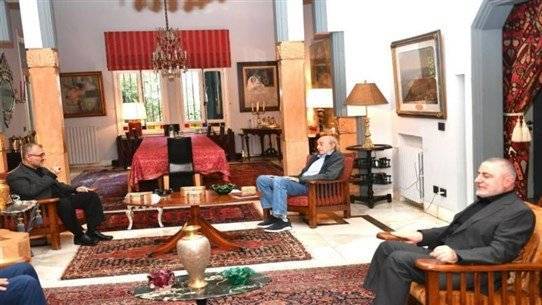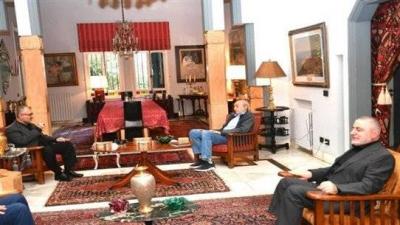The political sphere has been preoccupied with the atmosphere surrounding the recent meeting between the leaderships of "Hezbollah" and the "Progressive Socialist Party," which was characterized by differences on most strategic issues. This gathering marked the first of its kind in a long time following a period of disconnection between the two parties, which included intense political campaigns that reached their peak during the preparations for the parliamentary elections held on May 15.
The meeting, which took place between the head of the "Progressive" party, Walid Jumblatt, and the political aide to the Secretary-General of "Hezbollah," Hussein Khaleel, with the presence of MP Wael Abu Faour and former Minister Ghazi Aridi, who organized the meeting, as well as the Hezbollah liaison and coordination officer, Wafiq Safa, was not limited to the electricity file and the establishment of a sovereign fund to manage Lebanon's oil wealth. It extended beyond these themes to address the presidential election and the contentious issues that still divide the two parties, culminating in events that transpired about two weeks ago in the Syrian town of Sweida.
“Al-Sharq Al-Awsat” learned from sources closely related to the atmosphere of the meeting that Jumblatt raised fundamental issues regarding the weaponry of "Hezbollah," defense strategy, and the need to recognize the Lebanese sovereignty of the occupied Shebaa Farms, calling on the Syrian regime to prepare documents to submit to the United Nations acknowledging the Lebanese status of the farms to align them with Resolution 425.
The sources revealed that the meeting touched on international and regional situations related to the circumstances in Lebanon, including "Hezbollah's" relations with Iran, stating that the leap some made by interpreting this meeting as an indication of a Jumblatt pivot toward the axis of resistance was unfounded, emphasizing that it is unjust to judge intentions without taking a moment to explore the exchange of views that occurred during the meeting.
The presidential election was indeed a topic at the meeting, but not from the perspective of presenting candidates for the presidency. Rather, Jumblatt expressed his unwillingness to support a candidate affiliated with the "March 8 Forces," and he emphasized the importance of electing a president who does not provoke any side and has the capacity to engage with Arab countries and the international community to mend Lebanon's strained external relations.
Jumblatt expressed concern about Hassan Nasrallah’s recent call for forming a fully empowered government, questioning whether this indicated an imminent inability to elect a new president on time. Khaleel responded to Jumblatt's inquiries, stating that there needs to be consultations among the main parties and joint consideration for a president who can serve as a point of convergence among Lebanese, especially given the blockade imposed by the United States on Lebanon.
Khaleel, in response to Jumblatt's questions about Nasrallah's call for a legitimate government, mentioned that they seek both the formation of a new government and the timely election of a president, as they do not want a void in any institutions. Jumblatt again warned that a vacancy in the presidency would exacerbate the crisis and contribute to the ongoing destruction of what remains of the state's structure, leading the country into a deadly void instead of working together to agree on a president who does not provoke tensions and can address Lebanon's crucial need for international support.
Jumblatt advised against allowing a time period of presidential vacancy to pass, as the country cannot afford to be embroiled in uncalculated shocks that escalate political deadlock further. Khaleel responded that the party has no project to fill the vacancy, insisting on electing the president on time, although they expect that given current conditions, electing a president will not be easy.
Moreover, the recent drone activities launched by "Hezbollah" over the Karish field were mentioned, with Jumblatt questioning whether these could be seen as an Iranian message to improve its negotiating position regarding the nuclear file. Khaleel replied that Iran does not need drones to enhance its standing; rather, the aim is to improve Lebanon's position in maritime border negotiations.
Jumblatt also raised fears of a new war, to which Khaleel replied that if Israel continued to deny Lebanon its rights to maritime wealth, that could become a "lifeline," particularly since all options remain on the table. Jumblatt insisted that Lebanon cannot endure another war, especially in light of the difficult circumstances they face, urging negotiations alongside international and Arab efforts to pressure Israel.
Negotiations with the International Monetary Fund did not escape the discussions, as Jumblatt inquired about the party's stance on negotiations, to which Khaleel responded that there needs to be a thorough examination of the conditions set by the fund. However, Jumblatt underscored the necessity of negotiating with the IMF, provided that the government fulfills its required obligations, while simultaneously warning against the collapse of institutions—health and education—that reflected Lebanon's positive image abroad. He cited the devastating experience of Iraq, which obliterated its institutions and called for cooperation to spare Lebanon from a similar destructive experience.
Before the meeting concluded, which is expected to resume later, Jumblatt brought up the violent confrontations witnessed in the Syrian town of Sweida, resulting from a group of locals led by Sheikh Yahya al-Hajjaar clashing with factions associated with the Syrian regime, some linked to "Hezbollah." He called on "Hezbollah" to intervene to end this bloodshed, which led to 17 fatalities, to prevent fomenting tensions between the Druze community and "Hezbollah" in Lebanon, underlining the necessity of preemptive action to thwart those seeking to stoke discord, given that the Druze community in Syria has familial ties in Lebanon.
Finally, Jumblatt urged the leadership of "Hezbollah" not to succumb once again to the extortion of the head of the "Free Patriotic Movement," Gebran Bassil, stating, "especially since you have seen where this has led us in Lebanon."




